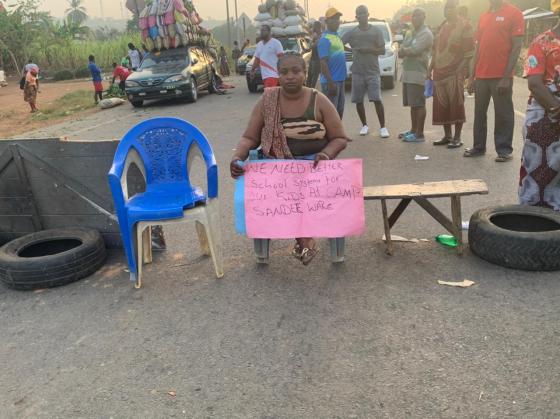The Clash of Competing Liberties: A Look into the AFL Wives’ Protest

By Cedrick Quoi Jones
While it may seem like the dust has settled and we now have respite after days of protests at military barracks around Liberia, the actions of the wives of the AFL leave much to be considered.
Let us be reminded that their actions subsequently led to the resignation of retired General Prince C. Johnson III, just a few days after his confirmation.
Many of the women involved may see his resignation as a sign of victory, for that was the true essence of their protests, hidden behind a mask of qualms raised against the former Chief of Staff of the AFL, which he has denied.
However, let us take a deeper look into the constitutionality of their protests. Did their actions deny other Liberians their constitutional rights to freedom of movement?
Were they justified, while exercising their “freedom to petition their government”, by blocking major roads in the country, thereby stalling or completely denying others their right to migrate?
These are just some of the issues that arise when such a situation happens. In a democracy, where the rule of law is a major driving force and the fundamental rights of citizens should not be curtailed or suppressed, everything should be done to make sure that everyone enjoys his or her rights as enshrined in the Constitution.
Article 17 of the Liberian Constitution states clearly: “All persons, at all times, in an orderly and peaceable manner, shall have the right to assemble and consult upon the common good, to instruct their representatives, to petition the Government or other functionaries for the redress of grievances…”
That Article makes it crystal clear that the AFL Wives, as we call them, had constitutional backing and were using that to their advantage. They used that basic fundamental right of theirs to petition their government and channel their grievances.
Such is the power of democracy and, once used for the common good, citizens see themselves as partners in the growth and development of the nation. As the Constitution says in Article 1, “All Power is inherent in the people.”
However, as citizens exercise their fundamental rights, it has to be made clear that such freedoms should not interfere with the freedoms of others. I cannot recall anywhere in our constitution where a group of people at any time and for any reason are given more freedom to exercise their rights than others.
The Constitution states clearly in Article 13 (a): “Every person lawfully within the Republic shall have the right to move freely throughout Liberia, to reside in any part thereof and to leave therefrom subject however to the safeguarding of public security, public order, public health or morals or the rights and freedoms of others.”
To my question as to whether the wives of the AFL were justified in blocking roads, I can confidently say that they weren’t. Regardless of what their petitions were, curtailing the free movements of citizens was totally uncalled for.
While an argument could be made that the turtle needed fire on its back, suggesting that was the only way for a deal to be reached, I think that it set a bad precedent going forward. If we think that resorting to unlawful means is the only way for our grievances to be settled, we are then treading on the wrong path.
For the past days when the protests raged on, hundreds of Liberians were stranded in several parts of the country unable to get to their destinations because of roadblocks and barricades that were installed by the protesting women.
Vehicles got stuck in huge traffic, while many people had to either light off and walk across the roadblocks, detour, or cancel their trips. The situation caused serious embarrassment for ordinary Liberians, who had no fish to fry in that oil.
We have to respect the rights and privileges of one another as Liberians and understand that where our rights stop, others’ rights begin.
The exercise of citizens’ right to petition their government through protests or demonstrations is completely constitutional, but doing so with a blatant disregard for the rights of others is not patriotic, and has the tendency to cause chaos if others feel that their fundamental rights, especially to free movement, must be respected.
The Author
Cedrick Quoi Jones is a Liberian Journalist. He holds a bachelor’s of Arts (BA) degree in Mass Communication from the University of Liberia. He is an emerging writer, a patriot who has a strong desire to see Liberia become a better country. He can be reached via cedrickjones350@gmail.com.
